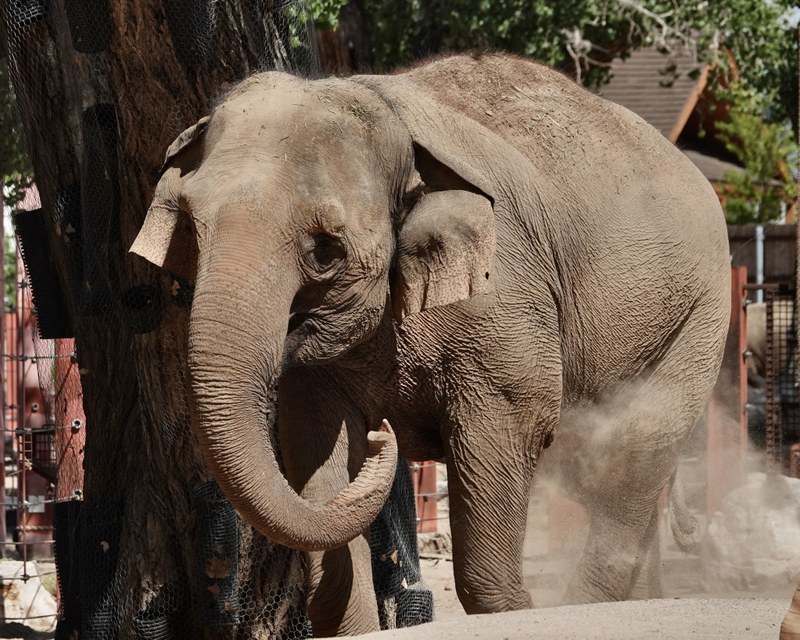
Elephant Birth Watch Begins at ABQ BioPark Zoo
The entire elephant care team is preparing for the elephant herd’s newest arrival
The ABQ BioPark’s elephant herd is growing! Birth watch has begun at the ABQ BioPark as we excitedly await the arrival of a new elephant calf. Rozie the Asian elephant is expecting her baby in December.
Rozie’s pregnancy may be the result of natural breeding or artificial insemination, both of which occurred in February 2023. Paternity will be determined through a DNA test after birth.
Volunteers work in shifts for birth watch by remote-viewing so as not to disrupt the herd. Overnight watching has begun to make sure someone always has eyes on Rozie to make sure she is healthy. Volunteers are trained to look out for and take note of specific behaviors that could indicate Rozie has begun labor.
The data collected will not only benefit Rozie, but will be logged into Zoo Monitor, a program that collects behavioral data which contributes to the research and wellbeing of animals in human care. The ABQ BioPark is among the first facilities to use Zoo Monitor to monitor a pregnant elephant.
The animal care staff has been training with Rozie in preparation for the baby’s arrival. She has been on a special low protein, high fiber, very low sugar diet. Amber Alink, curator of elephants and primates at the ABQ BioPark, says her “pregnancy craving” has been bok choy.
Rozie’s team has also been working with her to stay nimble. During the earlier months of her pregnancy, they focused on more rigorous exercise. Now that she’s in her last phase of pregnancy, they’re focusing on less rigorous, but just as consistent exercise and stretching to keep her limber and prepare her in case labor is long. Alink said they just want to reinforce everything that she’s done in the past for her previous births, and this training serves as a refresher course.
Did you know there’s a designated space for Rozie to give birth? In 2018, an arena was built specifically to give the elephants an area for a herd birth and a nighttime living space. For this birth, Alice, who is Rozie’s mother, will have the opportunity to be present with Rozie during the birthing process.
The BioPark has pioneered a method of herd birthing which allows for the elephant care staff to train the herd for the birth beforehand with the goal of having a more hands-off approach during labor. This means that Rozie will still be closely monitored during pregnancy and labor, but the care staff will allow Rozie to take the lead on this process and only interfere if mom or calf are in any danger.
“Rozie is an experienced mother,” said Alink. “This is her fourth birth and we have confidence in her and our care team to do what is best for mom and baby.”
Part of the training that the elephants undergo is to recall, which would allow the elephants to leave the space so the animal care staff can safely enter if something happens during the birthing process and they need to get immediate veterinary attention to the calf.
Additionally, the elephant care team has been working with Rozie to practice “bring me your baby.” Rozie will bring whatever “novel” item is in the area to her animal care staff so they can get a closer look at the calf when it’s here.
Asian elephants are an endangered species, and wild populations continue to decline due to habitat loss and fragmentation. The BioPark is designated as an Elephant Breeding Facility by the Association of Zoos and Aquariums' Elephant Species Survival Plan.
Every individual elephant is important for species survival, which is why the ABQ BioPark has planned numerous contingency plans, and worked on training to prepare for the best birthing outcome.
